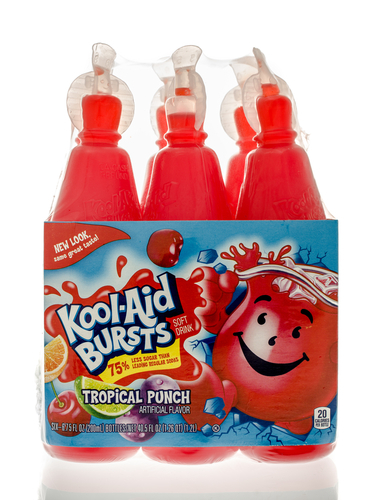Short answer
Yes, Kool-Aid is bad for you. Each cup of Kool-Aid has 20 grams of sugar, or to be precise, the equivalent of 5 teaspoons of sugar. Research has shown that the artificial dyes in Kool-Aid may cause hyperactivity in your child. Long-term consumption may increase the risk of obesity, diabetes, and even cancer.
Recommended Alternative
Long answer
Kool-Aid was introduced in the US back in 1927 and is sold as a powdered drink mix. The marketing message is that it is a "healthy" substitute for water; the reason being artificially added Vitamin-C is one of its ingredients.
But, what a lot of people don't know is that Kool-Aid is nothing but a massive dose of sugar, which we know causes an increase in inflammation and insulin. Regular intake of Kool-Aid increases blood sugar levels. The risks of developing obesity, diabetes, and cancer go up as well.
A team of researchers from the pediatrics department of Vanderbilt University recently published results from a year-long study. The study was regarding the effect of fructose on 29 adult Rhesus monkeys in the age range of 12-20 years (equivalent to 26-60 years in humans).
Rhesus Monkeys are physiologically similar to humans and have a propensity of developing similar chronic diseases. At the beginning of the study, all monkeys were fit and healthy and had normal blood glucose levels. Their diet was regular monkey lab meals, and they were given access to 500 ml of Kool-Aid per day.
The results were shocking, to say the least. Within 6 to 12 months of starting, four monkeys had developed Type II diabetes and the rest were well on their way. Their weight and body fat levels increased. The monkeys' fasting triglycerides shot up by a mammoth 87%. HDL (or good) cholesterol decreased and LDL (or bad) cholesterol increased, both by 14%. To sum up, within a year of the study, these monkeys were well on their way to a heart attack.
There have been quite a few studies which have proven a causal link between the dyes in Kool-Aid and hyperactivity in children. Red 40, one of the dyes in Kool-Aid, is in the process of being phased out in Europe. Our very own FDA tests have shown that the majority of widely used dyes, such as Red 40, have low levels of compounds which can lead to cancer.
Kool-Aid has been around for a long time and is advertised to be a healthier option than soft drinks and colas. However, taking into account the aforementioned, this might not be the case. Regular consumption is equivalent to a sugar bomb and can negatively impact your health in a number of ways.
In case you absolutely have to drink Kool-Aid, do so in moderation. Alternately, try a brand like True Lemon, which is free of artificial ingredients and preservatives.
Possible short-term side effects
- spike in blood sugar level
- hyperactivity in children
- dyes may turn stool turn green
Possible long-term side effects
- diabetes
- cancer
- inflammation
- obesity, and related effects
Ingredients to be aware of
- sugar
- citric acid
- calcium phosphate
- artificial flavor
- red 40
- blue 1

Our Wellness Pick (what is this?)
TRUE LEMON Drink Mix
- Real lemon used
- No preservatives
- Zero artificial sweeteners
- Gluten-free formula
- Stevia sweetened
 Approved by
Approved by 















